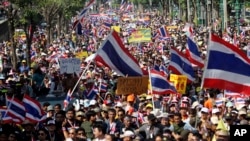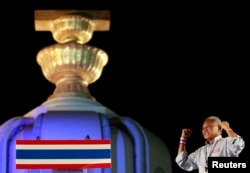BANGKOK —
Protesters hoping to stall Thailand's general elections, scheduled for February, thronged central Bangkok on Sunday as part of on-going rallies against the government of Prime Minister Yingluck Shinawatra. Meanwhile, the prime minister travelled to a governing party stronghold to campaign.
Tens of thousands of anti-government protesters brought central Bangkok to a halt Sunday in the campaign to force Prime Minister Yingluck Shinawatra to resign and put a halt to national elections on February 2. The protests were generally good-natured.
Protest leader and former opposition lawmaker Suthep Thangsuban told the crowds he was confident of ending influence in the government by Yingluck's older brother, Thaksin Shinawatra, a former prime minister who protesters accuse of corruption and abuse of power.
Protester Khun Kitina, an employee of a global information technology corporation, supported Suthep’s call to postpone the February ballot due to fears of corruption in the vote.
"We cannot accept the Thaksin system anymore and as you know they not do anything for the people. And if we have the election on the 2nd of February it will still have the corruption and Thaksin still have the power for the election team to perform the election. It cannot be a pure [clean] election from the people," she said.
Thaksin remains in self-imposed exile to avoid a jail term for corruption and other charges linked to his five-year term in office before the army ousted him in 2006. But pro-Thaksin parties, buoyed by rural voters, have won elections since then, the last in July 2011. But largely urban protesters accuse the government of abuse of power.
The rallies in Bangkok were launched in November after the Yingluck government passed legislation providing a blanket amnesty covering corruption and political crimes dating back eight years. The last-minute amended bill was seen to favor Thaksin to enable him to return to Thailand a free man.
Protester Khun Nat, a post-graduate university student, said he supported the call for the election to be delayed until political reforms were implemented.
"I want to see change in the right way, in the right way that we open our heart and speak together. We have the democracy, we have to respect the democracy but we have something bad behind it. We are Thai, we have the right to claim this back to our people," he said.
The outline for reforms remains unclear. Prime Minister Yingluck said after the election a national reform council would be set up to work towards widespread reforms. Protesters said the reforms should occur before an election.
On Sunday, Prime Minister Yingluck travelled to the northern provinces - a stronghold of the governing Pheu Thai Party, as anti-government protesters rallied outside her Bangkok residence, scuffling briefly with police.
The governing party appears set to strengthen its grip on parliament after the main opposition Democrat Party announced Saturday a boycott of the poll until reforms are implemented.
Thailand's Election Commission is weighing the possibility of relocating the venue for the registration of party-list parliamentary candidates in Bangkok, scheduled to start Monday, amid fears that protesters may try to prevent the registration going ahead.
Tens of thousands of anti-government protesters brought central Bangkok to a halt Sunday in the campaign to force Prime Minister Yingluck Shinawatra to resign and put a halt to national elections on February 2. The protests were generally good-natured.
Protest leader and former opposition lawmaker Suthep Thangsuban told the crowds he was confident of ending influence in the government by Yingluck's older brother, Thaksin Shinawatra, a former prime minister who protesters accuse of corruption and abuse of power.
Protester Khun Kitina, an employee of a global information technology corporation, supported Suthep’s call to postpone the February ballot due to fears of corruption in the vote.
"We cannot accept the Thaksin system anymore and as you know they not do anything for the people. And if we have the election on the 2nd of February it will still have the corruption and Thaksin still have the power for the election team to perform the election. It cannot be a pure [clean] election from the people," she said.
Thaksin remains in self-imposed exile to avoid a jail term for corruption and other charges linked to his five-year term in office before the army ousted him in 2006. But pro-Thaksin parties, buoyed by rural voters, have won elections since then, the last in July 2011. But largely urban protesters accuse the government of abuse of power.
The rallies in Bangkok were launched in November after the Yingluck government passed legislation providing a blanket amnesty covering corruption and political crimes dating back eight years. The last-minute amended bill was seen to favor Thaksin to enable him to return to Thailand a free man.
Protester Khun Nat, a post-graduate university student, said he supported the call for the election to be delayed until political reforms were implemented.
"I want to see change in the right way, in the right way that we open our heart and speak together. We have the democracy, we have to respect the democracy but we have something bad behind it. We are Thai, we have the right to claim this back to our people," he said.
The outline for reforms remains unclear. Prime Minister Yingluck said after the election a national reform council would be set up to work towards widespread reforms. Protesters said the reforms should occur before an election.
On Sunday, Prime Minister Yingluck travelled to the northern provinces - a stronghold of the governing Pheu Thai Party, as anti-government protesters rallied outside her Bangkok residence, scuffling briefly with police.
The governing party appears set to strengthen its grip on parliament after the main opposition Democrat Party announced Saturday a boycott of the poll until reforms are implemented.
Thailand's Election Commission is weighing the possibility of relocating the venue for the registration of party-list parliamentary candidates in Bangkok, scheduled to start Monday, amid fears that protesters may try to prevent the registration going ahead.








